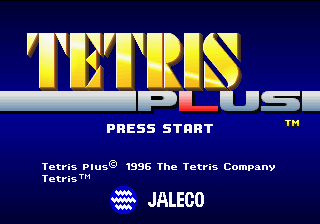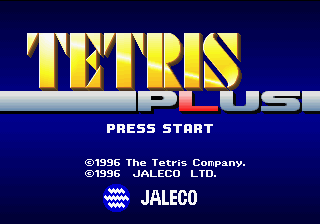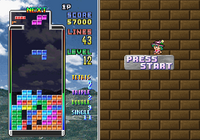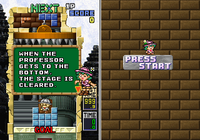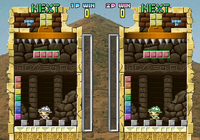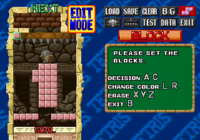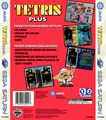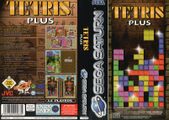Tetris Plus
From Sega Retro
| ||||||||||||||||||||||||||||||||||||||||
| Tetris Plus | ||||||||||||||||||||||||||||||||||||||||
|---|---|---|---|---|---|---|---|---|---|---|---|---|---|---|---|---|---|---|---|---|---|---|---|---|---|---|---|---|---|---|---|---|---|---|---|---|---|---|---|---|
| System(s): Sega Saturn | ||||||||||||||||||||||||||||||||||||||||
| Publisher: Jaleco (Japan, US), JVC Music Europe (Europe) | ||||||||||||||||||||||||||||||||||||||||
| Developer: Natsume Co., Ltd. | ||||||||||||||||||||||||||||||||||||||||
| Distributor: Ecofilmes (PT) | ||||||||||||||||||||||||||||||||||||||||
| Licensor: The Tetris Company | ||||||||||||||||||||||||||||||||||||||||
| Original system(s): Arcade boards | ||||||||||||||||||||||||||||||||||||||||
| Developer(s) of original games: Jaleco | ||||||||||||||||||||||||||||||||||||||||
| Sound driver: SCSP/CD-DA (50 tracks) | ||||||||||||||||||||||||||||||||||||||||
| Peripherals supported: Saturn Backup Memory | ||||||||||||||||||||||||||||||||||||||||
| Genre: Puzzle[1][2] | ||||||||||||||||||||||||||||||||||||||||
| Number of players: 1-2 | ||||||||||||||||||||||||||||||||||||||||
| ||||||||||||||||||||||||||||||||||||||||
|
Tetris Plus (テトリスプラス) is a 1995 arcade game by Jaleco ported to multiple game systems including the Sega Saturn.
Tetris Plus is notable for being the first successful release of a Tetris-branded game on a game console not developed or owned by Nintendo, who previously held console exclusivity rights to Tetris. It is the first officially licensed Tetris game on a Sega console since Tetris for the Mega Drive was blocked from release, predating the release of Tetris-S by several months.
Contents
Gameplay
Tetris is a falling block puzzle game. Pieces made of four squares, called tetrominoes, fall from the top of the screen one at a time into a playing field. The player can rotate and move the pieces so that they fit together. When a piece is placed on top of another piece, it is locked in place and a new piece starts to fall. If the player forms a horizontal line, it is cleared and any lines above it fall downward. More points are awarded for clearing more lines in one move. The most lines that can be cleared at once is four, which is called a "tetris." Tetrominoes come in five different shapes. The game ends when the uncleared lines reach the top of the playing field.
The ruleset is based off Sega rotation, with a notable difference being that pieces spawn right-middle.
Pieces are moved with ![]() and
and ![]() . They are dropped faster with
. They are dropped faster with ![]() . Pieces are rotated clockwise with
. Pieces are rotated clockwise with ![]() or counterclockwise with
or counterclockwise with ![]() or
or ![]() .
.
Modes
Classic Mode
Classic mode plays like traditional Tetris. It is an endless mode that continues until the player loses. On each side of the playing field is a rainbow-colored bar that rises as the player clears lines. Once the bars are completely filled, the next tetromino locked into place advances the player to the next level. This increases the speed level (up to level 25), increases the points awarded for each cleared line (up to level 10), and clears the bars. The game always starts at level 1, with no level select available.
The initial point values are 100 points for a single (one line cleared), 400 points for a double, 800 points for a triple, and 1,600 points for a tetris (four lines cleared). There are four difficulty levels (Easy, Normal, Hard, and Very Hard).
The game appears in a vertical split screen. A second player can start a separate game on the other side of the screen at any time by pressing START on a second control pad. This is a non-competitive mode, so players cannot affect each other's games.
Puzzle Mode
This is a mission-based mode where the player have a limited amount of time to clear pieces arranged in a prearranged layout. Following a simple plotline of a Professor and his assistant seeking ancient treasure, there are four zones (Egypt, Angkor Wat, Maya, and Knossos) immediately selectable, with 20 puzzles each. The final area, Atlantis, is unlocked by successfully completing all of the other zones. The player's progress is saved to one of three slots in the Saturn's internal memory.
In each puzzle, the Professor is placed in a play field with preplaced blocks, and a spinning spiked ceiling gradually lowers on top of him. The objective is to get the professor to fall to the bottom of the play field, by placing blocks and clearing lines, before the spiked ceiling at the top comes down and crushes him. The spiked ceiling falls slowly, destroying any placed blocks that are in its way and reducing the size of the play field. Clearing three or four rows at once moves the ceiling back up. The player is awarded a time bonus depending on how quickly the puzzle is completed.
The Professor is two blocks square and aimlessly walks forward until he bumps into a block and turns around. If he comes across a gap that is large enough for him to fit through, he falls down onto the blocks below him. Conversely, if blocks are placed on top of him, he climbs up them until he reaches the top. If he is unable to move, he falls asleep until either a block comes down onto him or the ceiling reaches his current position. The puzzle is failed if the ceiling touches the Professor.
Vs Mode
This is a mode where two players compete with each other in a variation of the Puzzle Mode rules. When players clear two or lines at once, they send new lines (with one missing block so they are not cleared) to the bottom of their opponent's play field. Clearing two lines sends one line, clearing three lines sends two lines, and clearing four lines sends three lines.
The first player to get their professor to the bottom of the screen wins. A player also wins if their opponent's Professor hits the spiked ceiling. There are ten different layouts of preplaced blocks used for the initial play fields. Matches are played to the best of three games (but this can be changed in the options to 1, 5, or 7).
Edit Mode
An editor that allows players to create their own Puzzle Mode puzzles. The player can change the background, place blocks, move the Professor, and adjust the height of the ceiling.
Blocks are placed with ![]() or
or ![]() or erased with
or erased with ![]() ,
, ![]() , or
, or ![]() . The color of placed blocks can be changed with
. The color of placed blocks can be changed with ![]() and
and ![]() . The selection is canceled with
. The selection is canceled with ![]() .
.
Up to ten puzzles can be saved to the Saturn's internal memory.
Production credits
- President: Yoshiaki Kanazawa
- Managing Director of the Overseas Dept.: Mitsuo Makise
- Director: Atsumi Takino
- Programmers: Hiroyuki Masada, Ryo Wasaki, Masahiro Iwasa, Daisuke Tanabe
- Graphics: Kana Hirano, Nobuyuki Yoshida, Kazuhiko Kawai
- Director of Consumer Development: Hiroshi Nunokawa
- Producer: Toshikazu Iwasa
- Graphic Design: Suuichi Kajihara, Masafumi Fujii
- Sound: Iku Mizutani, Sinya Kurahasi, Hikaru Tamura
- Game Design: Taro Sasahara
- Programmer: Rerorero, -M-
- Graphic Design: Tatsuhiro Suzuki, Matsuo Pyonkey, Hiroshi Shigesawa
- Sound: NIS, Sawa Kazuo
- Special Thanks: Norifumi Hara
- President: Howe Rubin
- Executive Vice-President: Haruo Hori
- Product Manager: Jarik R. Sikat
- Japanese Language Translation: Yukiko Tanaka
- Sales Administration: Amy Choi Marquez
- Package Design: Murre Lienhart Rysner & Associates
- Instruction Manual Layout: Lurka R. Sikat
- Special Thanks to: Abby Rubin, Steve Sleigh, Shirley Vega, Ed Manning
Magazine articles
- Main article: Tetris Plus/Magazine articles.
Promotional material
also published in:
- Electronic Gaming Monthly (US) #89: "December 1996" (1996-xx-xx)[8]
Physical scans
| Sega Retro Average | ||||||||||||||||||||||||||||||||||||||||||||||||||||||||||||||||||||||||||||||||||||||||||||||
|---|---|---|---|---|---|---|---|---|---|---|---|---|---|---|---|---|---|---|---|---|---|---|---|---|---|---|---|---|---|---|---|---|---|---|---|---|---|---|---|---|---|---|---|---|---|---|---|---|---|---|---|---|---|---|---|---|---|---|---|---|---|---|---|---|---|---|---|---|---|---|---|---|---|---|---|---|---|---|---|---|---|---|---|---|---|---|---|---|---|---|---|---|---|---|
|
| 67 | |
|---|---|
| Based on 18 reviews | |
Technical information
- Main article: Tetris Plus/Technical information.
References
- ↑ File:TetrisPlus Saturn JP Box Back.jpg
- ↑ 2.0 2.1 https://sega.jp/fb/segahard/ss/soft_licensee2.html (Wayback Machine: 2020-03-20 23:05)
- ↑ Sega Saturn Magazine, "1996-12 (1996-07-26)" (JP; 1996-07-12), page 12
- ↑ http://sega-saturn.com/software.htm (Wayback Machine: 1996-12-15 06:01)
- ↑ 5.0 5.1 GamePro, "December 1996" (US; 1996-xx-xx), page 148
- ↑ Computer Trade Weekly, "" (UK; 1997-10-13), page 35
- ↑ File:Tetrisplus sat us manual.pdf, page 9
- ↑ Electronic Gaming Monthly, "December 1996" (US; 1996-xx-xx), page 263
- ↑ GamesMaster, "November 1997" (UK; 1997-10-01), page 76
- ↑ Ação Games, "Fevereiro 1997" (BR; 1997-xx-xx), page 31
- ↑ Edge, "February 1997" (UK; 1997-01-24), page 91
- ↑ Electronic Gaming Monthly, "October 1996" (US; 1996-xx-xx), page 61
- ↑ Famitsu, "1996-09-06" (JP; 1996-08-23), page 1
- ↑ Game Informer, "October 1996" (US; 1996-xx-xx), page 53
- ↑ Joypad, "Octobre 1996" (FR; 1996-xx-xx), page 74
- ↑ MAN!AC, "11/96" (DE; 1996-10-09), page 52
- ↑ Mean Machines Sega, "January 1997" (UK; 1996-12-06), page 69
- ↑ Next Generation, "November 1996" (US; 1996-10-22), page 274
- ↑ Saturn Fan, "1996 No. 16" (JP; 1996-07-19), page 161
- ↑ Saturn Fan, "1996 No. 21" (JP; 1996-10-04), page 62
- ↑ Saturn Power, "November 1997" (UK; 1997-09-17), page 78
- ↑ Sega Magazin, "November 1997" (DE; 1997-10-15), page 78
- ↑ Sega Power, "January 1997" (UK; 1996-12-19), page 39
- ↑ Sega Saturn Magazine, "January 1997" (UK; 1996-12-17), page 78
- ↑ Sega Saturn Magazine, "1996-16 (1996-09-27)" (JP; 1996-09-13), page 243
- ↑ Sega Saturn Magazine, "Readers rating final data" (JP; 2000-03), page 16
| Tetris Plus | |
|---|---|
|
Main page | Comparisons | Magazine articles | Reception | Technical information
Demos: Tetris Plus Mihonban (1996)
Prototypes: 1996-07-22
| |
| Tetris and Tetris-like games for Sega systems/developed by Sega | |
|---|---|
| Sega: Tetris (1989) | Flash Point (Mega Drive) (1989) | Bloxeed (1989) | Sega Tetris (1999) | Sega Ages 2500 Series Vol. 28: Tetris Collection (2006) | Tetris Giant (2010) | Puyo Puyo Tetris (2014) | Tetris (2019) | Puyo Puyo Tetris 2 (2020) | |
| Third-Party: Blockout (1991) | Tetris Plus (1996) | Tetris S (1996) | Tetris 4D (1998) | The Next Tetris: On-Line Edition (2000) | Tetris Kiwamemichi (2004) | Tetris The Grand Master 4: The Masters of Round (unreleased) | |
| Unlicensed: FA Tetris (1990) | Super Columns (1990) | Super Tetris (19xx) | Flashpoint (19xx) | |
| Tetris related media | |
| Tetremix (1989) | Flash Point/Bloxeed (1990) | New Century (2006) | Puyo Puyo Tetris 1 & 2 Original Soundtrack (2020) | |
- Saturn Backup Memory-compatible games
- 1-2 player games
- JP Saturn games
- All JP games
- US Saturn games
- All US games
- EU Saturn games
- All EU games
- DE Saturn games
- All DE games
- PT Saturn games
- All PT games
- UK Saturn games
- All UK games
- PL Saturn games
- All PL games
- Saturn games
- 1996 Saturn games
- All 1996 games
- Saturn puzzle games
- All puzzle games
- All games
- Old-style rating (gamesmaster)
- Update ratings template
- 1 old ratings
- Tetris Plus
- Tetris (franchise)
